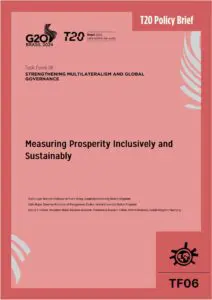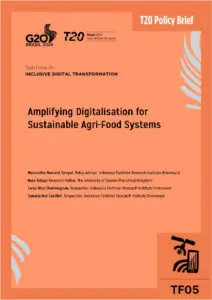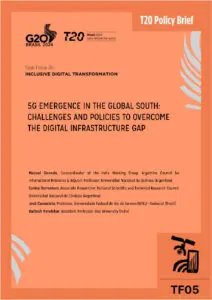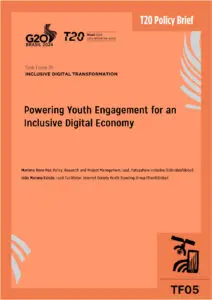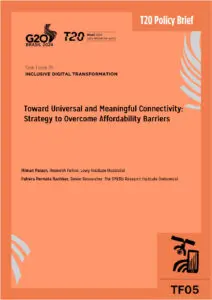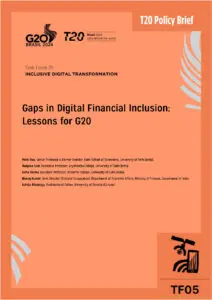The V20 is an initiative that has encouraged G20 Leaders to use the annual summit to better connect with their citizens. The G20 is underpinned with ministerial and task force policy efforts. But the V20 urges leaders and their officials to strengthen their connection with citizens devoting far more attention to the accessibility and clear content from their meetings. In a time of great public uncertainty over the multilateral order and appeals to openness, the V20 believes that G20 Leaders must affirm to their citizens and beyond that are fully aware of the concerns and unease expressed by many of their citizens. G20 Leaders need to communicate their determination to significantly strengthen the capacities of G20 economies to deliver better economic and social outcomes and address in improved ways the inequality within societies.
The V20 has selected a series of actions that it believes will improve the economic well-being of citizens. Among the actions identified, the V20 proposes several trade initiatives that it believes will aid in the effort to avoid trade protectionism that continues to stalk the global economy and to avoid trade policies that could undermine efforts to transition to lower carbon economies.
The V20 urges G20 Leaders to insist on the preparation of several trade reports. These reports would among other things assist G20 Leaders to: one fashion appropriate destination-based tax adjustment systems, and more generally a Border-Adjustment Tax (BAT) that are compatible with WTO requirements; and then a report(s) on the trade climate change nexus. G20 leaders need to prevent the trading system from advantaging countries that fail to adopt significant nationally determined contributions (NDCs) reducing carbon dioxide emissions.
Challenge
The T20 Trade and Investment Taskforce (“TITF”) identified what it saw as the critical proposals for trade and investment at the Hamburg Summit. According to the TITF, such critical proposals included: (1) supporting the World Trade Organization; (2) being upfront about the mixed effects of trade and investment; (3) improving G20 measures to tackle protectionism; and (4) promoting investment facilitation.
In the recent nationalist anti-globalization upsurge that has affected a number of the G20 members, the V20 believes that it is critical to tackle protectionism that appears to be centered in the G20 members themselves, and to speak out and act to maintain an open and rules-based trading system encouraging prosperity that can be shared more broadly. In addition, the V20 thinks that it is vital encourage G20 efforts to meet their commitments to the 2030 Agenda, especially with respect to climate change and the national commitments to shift to a lower carbon emission economies. The rise of nationalist and anti-globalization sentiment has been strong and, as noted by the TITF:
Trade policy has emerged as one of the most contested policy fields during Germany’s G20 presidency. It is important to acknowledge that trade is central to the G20’s core mission as it contributes to economic recovery and growth and is therefore highly relevant for all G20 countries. It therefore needs to be high on the agenda of both the G20 Sherpa and Finance tracks.
As a result, the TITF suggests:
While it is imperative, in the short run, to prevent the trade system from slipping into a protectionist downward spiral, returning to business-as-usual will not be enough, and serious reforms of international trade policies as well as effective domestic adjustment policies are needed.
The TITF set the following for the G20 Leaders’ Summit in 2017:
Therefore, the minimum goal for the G20 in 2017 must be to find common support among all G20 countries for an open and rules- based trading system, while reiterating the need for a moratorium on protectionist measures.
Discussions among G20 countries about trade, according to the TITF, “need to be embedded in the framework provided by the 2030 Agenda and the G20 Action Plan on the 2030 Agenda for Sustainable Development.” In examination of the agenda for the final T20 of the German presidency entitled, “Global Solutions – G20: The Think 20 Summit Berlin 29-30 May 2017”, organizers urged that the role of the WTO be reinforced and raised the following concerns:
Which measures should the G20 adopt at the Hamburg summit to tackle protectionism in its various forms in G20 and non-G20 countries? How can the surveillance role of the WTO be strengthened to avoid the adoption of new protectionist measures and dismantle already exiting measures?
The V20 acknowledges and adopts the TITF perspectives as well as that expressed by the Organizers in “Global Solutions” but believes that additional concrete actions can be identified. The concern all around is that G20 countries not adopt trade policy changes that raise protectionist barriers. Further the V20 is concerned that options not be adopted that set conditions that disadvantage countries that seek to achieve G20 goals including the Agenda 2030 and climate change commitments that have been made, or that are required, if the G20 countries are to substantially assist in moving to lower carbon-emitting economies.
The analysis presented points in two policy directions: one to deal more effectively with protectionist currents running through the global trade system, principally driven by the G20 countries; and to reflect domestic policies that avoid amplifying inequality within the G20 countries and encourage implementation of more effective adjustment policies.
Proposal
1) Supporting the Role of the WTO: Examining the Border Adjustment Tax Systems
The V20 believes that G20 Leaders could support a declaration committing leaders to focus on trade liberalization but with a determination towards a better sharing of the benefits of trade to all The G20 building on the work of trade policy research institutes and international organizations call on the WTO, UNCTAD and the OECD to prepare a report on various proposals for BAT with attention to those proposals that could be acceptable to the requirements of the WTO.
New BAT implementation, depending on the form it takes, may or may not ‘pass WTO muster’. The Trump administration appears to be considering such a new trade and tax measure, and the House Majority Leader, Paul Ryan is known to support a BAT. As a rule, under a BAT, imported goods cannot be discriminated against (via extra taxes) relative to similar domestically produced goods, after the relevant tariffs (agreed through multilateral trade negotiations) are paid. But it is unclear whether the proposals currently being examined will be seen to be WTO- compatible. In a recent article, trade expert Douglas Irwin (2017, 55) suggested the following:
Such measures are standard practice for countries that have value-added taxes and wish to equalize the tax treatment between domestic and foreign goods, and they are consistent with WTO rules. Whether the particular border adjustment tax that Congress is considering now conforms to WTO rules remains an open question.
The V20 believes that such a report(s) could strengthen the role of the WTO and avoid likely protectionist and trade distorting policy measures.
2) Supporting the Role of the WTO: Identifying WTO-Compliant Carbon Emission
Frameworks
In the Synthesis Report (Report) by the E15 Expert Group on Measures to Address Climate Change and the Trade System (E15 Expert Group) (Bacchus: 2016, 2), describes the relationship of trade and climate change: “The intersection between trade and climate change are complex and inevitable.” Building on a series a reports the Synthesis Report sets out a series of options and categories with the most critical for this policy proposal identified as:
- Maximizing the contribution of trade and minimizing conflicts between regimes;
- Recognizing embedded carbon in trade;
- Enabling the formation of climate and coalitions; and
- Reaching a framework for emissions trading, carbon taxes, and border measures.
The E15 Expert Group, prior to this Synthesis Report, issued a series of valuable reports on the intersection of trade and climate change. As the E15 Synthesis Report Foreword (prepared by the co-conveners of the E15 Expert Group – ICSTD, the World Economic Forum and Climate Strategies) points out “… it is fair to say that experts and academics are bolder when it comes to recognizing the interlinkages than policy-makers or the intergovernmental organizations governing the issues, …”
The V20 believes that it is time to call on the WTO, UNCTAD and the OECD, with the support of the E15 Expert Group to prepare a report, or reports that identify measures and frameworks that can minimize the friction between the two policy regimes but eliminate in the short term economic advantages for countries unwilling to sufficiently reduce carbon emissions in their production and trade processes.
The Synthesis Report includes some 24 policy options. Many deserve attention by Ministers, International Financial Institutions, including the WTO, and finally G20 Leaders. A significant number of these options reveal the tensions between the trade and climate change regimes. As the Synthesis Report suggests (Report: 2016, 6) “it is necessary to anticipate potential conflicts and to prevent legal collisions between WTO rules and national and international measures taken to address climate change.” Many of the options call for acknowledgement by one regime of the other’s actions. So, for instance an option is to have the WTO members recognize that a measure taken by a WTO member that is found to be in furtherance of a national climate “contribution” in a climate agreement will be respected in a WTO dispute settlement and considered in compliance with its WTO obligations.
Possibly a starting point for the research examination of the policy options urged could include:
- A determination by the WTO that 2 products are not “like” based on the amount of carbon used in making the products. As the Synthesis Report (Report: 2016, 7) makes clear: “In our view, the uniqueness of the existential global challenge of climate change fully justifies carving out some kind of a limited exception for distinctions between and among trade products on the basis of carbon use and carbon emissions.”
- Establishing an agreed common international standard for calculating the amount of carbon used in the making of traded products.
- Waivers from WTO obligations for trade restrictive “climate measures” that are based on the amount of carbon used in the making of a product and are undertaken to further compliance for NDC’s.
- An examination of the consequences of declaring that a carbon tax or similar tax based on the amount of carbon used in making the product is an indirect tax on a product and as a result, as the Synthesis Report suggests (Report: 2016, 8), “… therefore eligible for a “border tax adjustment” under Article II:2(a)of the GATT, …”
The above policy initiatives appear designed to examine, in one manner or another embedded carbon in trade. The V20 believes that this is a valid starting point for inquiry into the nexus of trade and climate change and should be undertaken following a declaration by the G20 to prepare reports on these matters. The climate change and the trade communities must begin work together to, as the Synthesis Report (Report: 2016, 10) suggests, … explore mutual solutions to prevent a collision between the two regimes, and, further, to foster and facilitate an ongoing cooperation and collaboration between the two regimes.”
References
- IMF, World Bank, WTO Staff. 2017. “Making Trade and Engine of Growth for All: The Case for Trade and for Policies to Facilitate Adjustment”, Prepared for the G20 Sherpa Meeting, Frankfurt Germany, March 23-24, 2017
- Foreign Affairs. 2016. “Who Benefits from Trade?” – An Anthology.
- Rodrik, Dani. 2017. “Is Global Equality the Enemy of National Equality? John F. Kennedy School of Government Harvard University,
More Information



